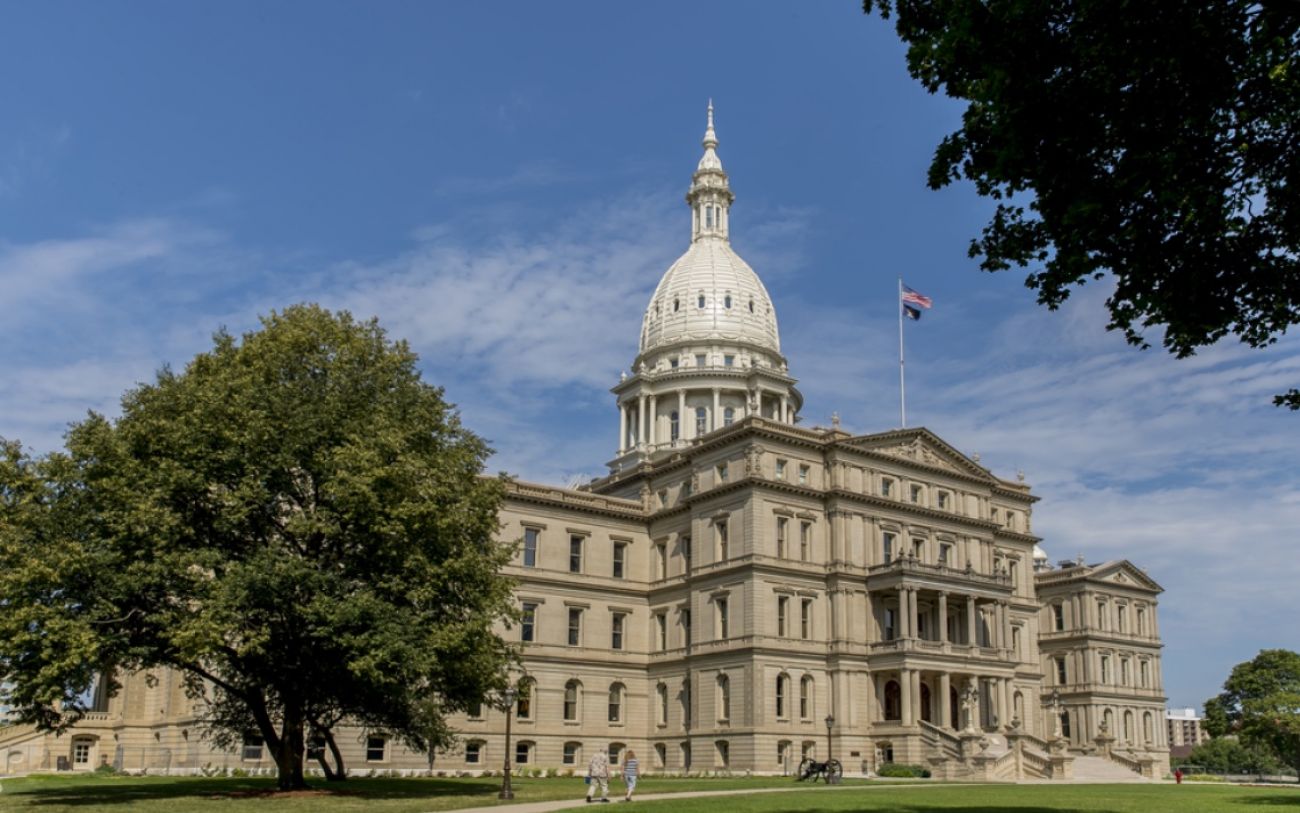Schools spared, pork added, Pure Michigan restored in $62.8B state budget

LANSING — My, what a difference a few months can make.
Four months after predicting that a crippling decline in state tax revenue from COVID-19 would force school funding cuts of up to $2,000 per student, state Sen. Wayne Schmidt on Wednesday voted for a Michigan budget that will instead give schools a modest bump of $65 per pupil.
“Under the circumstances, to maintain per pupil funding, to actually increase it, is tremendous,” Schmidt, who chairs the K-12 budget subcommittee, told reporters outside a committee hearing, removing his COVID-19 mask to reveal a proud smile.
Related stories:
- Whitmer, GOP leaders ditch transparency on budget for secret COVID deal
- Schools, local governments spared from cuts under Michigan budget deal
- Gretchen Whitmer, Republicans strike deal to plug $2.2B Michigan budget hole
Schools were not the only entities spared from potential cuts in the $62.8 billion budget negotiated behind closed doors by Democratic Gov. Gretchen Whitmer and Republican legislative leaders. While the deal includes $250 million in targeted cuts, many of them related to health care savings from the federal government, the plan actually will increase funding for most state departments and agencies.
The state’s unexpectedly fast economic rebound from COVID-19 and federal assistance helped Michigan avoid the $3 billion budget hole experts once predicted. Whitmer and lawmakers used federal dollars and tapped state fund reserves to at least delay sharper cuts.
Draining the School Aid Fund “was the key” for the education budget, said Schmidt, R-Traverse City. “It’s going to be tough next year.”
Michigan legislators unveiled and approved budget bills Wednesday in a series of bipartisan votes, sending the package to Whitmer's desk a week ahead of the Oct. 1 deadline mandated by the state Constitution.
Whitmer said she'll soon sign the budget, which "funds shared priorities that will move Michigan forward."
Educators: It could have been worse
Michigan school districts will not get the $150 per pupil foundation allowance increase Whitmer proposed in February, before the pandemic hit the state.
But given dire spring predictions, school groups appear relatively happy with the final deal, which includes an extra $65 per pupil along with another $66 million to help schools taking on additional transfer students this year.
Schools will receive a foundational allowance of $8,111 to $8,529 per pupil.
“It's a flat foundation from last year plus another $65 per pupil thrown in,” said Bob McCann, executive director of the Tri-County Alliance for Public Education, a superintendent group in metro Detroit. “That's pretty much the bulk of it. It's not a bad budget by any stretch, though coming far too late and still loaded with pork spending that should be going to our classrooms instead. It is what it is.”
State funding for universities and community colleges will remain flat, news that was generally welcomed by the education community.
“We’re very pleased with a flat budget, given the circumstances and the revenue projections back in spring,” said Bob Murphy, chief policy officer for the Michigan Association of State Universities. “It recognizes how important teaching and research at public universities is to the state’s wellbeing, especially during an international pandemic.”
The deal also includes $30 million in funding for a new Michigan Reconnect job retraining program, a top priority of Whitmer's, which provides financial aid to residents over the age for an associate degree or certificate at a community college or trade school. It also restores roughly $29 million for the previously vetoed Going Pro skilled trades training grant program.
Another $12.6 million will go toward a "Healthy Moms" program providing resources to pregnant women, and $26 million to expand childcare access by increasing the income qualification threshold.
More pork, less fat?
Despite fears that COVID-19 could still cause a multibillion budget hole in 2022, lawmakers did not shy away from inserting personal pet projects into the spending plan. The deal includes $31.3 million for 33 “Michigan enhancement grants,” including:
- $1 million for the Sloan Museum in Flint
- $750,000 to help maintain the Langley Covered Bridge in St. Joseph County, considered the longest remaining wooden-covered bridge in Michigan
- $85,000 for renovations to the old home of former Michigan Gov. Fred M. Warner in Farmington
- $500,000 for the Michigan Aerospace Manufacturers Association, which is planning space launch centers in Oscoda and Marquette
- $1 million for the Van Andel Institute, a biomedical research nonprofit in Grand Rapids
- Railway improvements in Grand Traverse County ($500,000), Chippewa County ($200,000), Alcona County ($300,000), Gaylord/Otsego ($154,000), Arenac County ($41,000), Bay County ($94,000), Gratiot County ($211,000)
Whitmer derided millions in "pork spending" by the Republican-led Legislature before she took office in 2019 but last year struck a deal allowing legislators to continue doling out grants so long as recipients adhere to new reporting requirements.
Under the budget, award recipients must sign a grant agreement with the Michigan Strategic Fund, provide quarterly updates on the grant status and respond to "reasonable requests" from the state.
Transparency gets cut
Negotiated entirely behind closed doors, most Michigan lawmakers didn’t get a look at the budget deal until Tuesday, and details were not made public until Wednesday, the morning of planned votes. That means taxpayers who fund state government, and interest groups that depend on allocations to provide services, were left almost completely in the dark.
Whitmer and Republican legislative leaders have called budget secrecy a byproduct of a highly unusual budget year, given COVID-19, but transparency advocates say it’s the latest in a string of concerning decisions from Lansing that leave the public out of the decision-making process.
“I would have liked to have a whole lot more of the committees and having public comment brought in,” said Senate Appropriations Chairman Jim Stamas, a Midland Republican who was part of the closed-door negotiations. “That was probably one of the larger challenges.”
Pure Michigan is coming back
A year after Whitmer vetoed $37 million in funding for Pure Michigan during a tense budget stand-off with Republican legislators, both sides agreed to a spending plan that will restore $15 million in state funding for the tourism advertising campaign.
The deal also authorizes local and private groups to kick in up to $10 million for Pure Michigan, bringing total resources for the program to $25 million for the fiscal year that begins Oct. 1.
“I’ve always supported Pure Michigan,” Whitmer told reporters in February, when she first proposed restoring funding she had vetoed. “The tourism industry thinks there should be additional dollars there, and I’m eager to work with them in terms of where those dollars might come from.”
Detroit prisoner Reentry Center to close
The Michigan Department of Corrections will close a prisoner re-entry center in Detroit in January, a decision leaders say is warranted by the state’s plummeting recidivism rate, which has dropped from almost 45 percent to 26.7 percent over the last 20 years.
That’s good news for the state, which says fewer people are commiting crimes that warrant imprisonment or violate parole. But it’s bad news for the 220 people who work at the Detroit facility, some of whom could be transferred to fill other vacancies.
The closure is expected to save the state $12.3 million next fiscal year.
“The decision to close a facility is always hard, and I realize this will be a difficult time for the staff at DRC,” Department of Corrections Director Heidi Washington said in a statement. “We understand and value the hard work and dedication the staff have shown, and it is our hope to find places for them within the department to continue that effort.”
State Rep. Tenisha Yancey, a Harper Woods Democrat, blasted the cut, arguing the Detroit reentry center will "quickly become an eyesore" if the state does not have a new plan for it. By agreeing to the closure, Whitmer is "once again showing a lack of respect for Black voters who helped elect" her, Yancey argued in a floor speech.
Hazard pay for frontline workers
The budget deal includes another $150 million in hazard pay for direct care workers on the frontlines of the COVID-19 pandemic, including nurses, nursing assistants and respiratory therapists. They’ll qualify for a $2-an-hour wage increase for three months. That’s on top of the $120 million Whitmer and lawmakers previously approved to provide the same hourly pay bump through the end of September.
The 2021 budget also includes $15 million for deferred maintenance projects at each of the state’s five inpatient psychiatric hospitals and $5 million for four of those facilities — Kalamazoo, Walter P. Reuther, Hawthorn, and the Center for Forensic Psychiatry — to hire a combined 60 new direct care staffers.
Road fixes coming despite gas tax declines
Michigan gas taxes and registration fees are down because residents drove less during the height of the pandemic, but spending on highways, roads and bridges is still expected to increase in 2021.
That’s because the new budget finally phases in the full $600 million income tax diversion from a 2015 road funding law, up from $493 million, and because the Whitmer administration is borrowing money to rebuild some of the state’s most highly traveled freeways after failing to convince the Legislature to raise gas taxes last year.
Local road agencies are projected to receive $1.8 billion in state funding next fiscal year, an increase of about $35 million.
The state is projected to collect fewer taxes and fees for its own state trunkline and bridge construction program, which is cut by $2.5 million in the budget to $1.3 billion. But separately, the Michigan Department of Transportation last week issued $800 million in bonds, the first phase of what is expected to be a $3.5 billion spending boost over five years.
Local governments ‘pleasantly surprised’
Local governments that provide services like police, fire and trash removal are breathing a sigh of relief after state revenue sharing was also spared from any significant budget cuts. All told, cities, villages and townships will get a combined $261 million in statutory revenue sharing from the state, along with a projected $865 million from state sales tax collections.
The budget deal also includes an extra $1.2 million for “distressed” communities that are struggling with financial hardships, $20 million for business attraction and community revitalization programs and $15 million in additional federal block grants. The budget also includes $5 million for historic preservation if lawmakers and the Whitmer administration agree to restore a program that was cut under former Gov. Rick Snyder.
See what new members are saying about why they donated to Bridge Michigan:
- “In order for this information to be accurate and unbiased it must be underwritten by its readers, not by special interests.” - Larry S.
- “Not many other media sources report on the topics Bridge does.” - Susan B.
- “Your journalism is outstanding and rare these days.” - Mark S.
If you want to ensure the future of nonpartisan, nonprofit Michigan journalism, please become a member today. You, too, will be asked why you donated and maybe we'll feature your quote next time!




